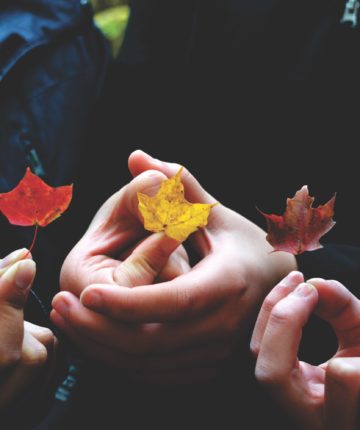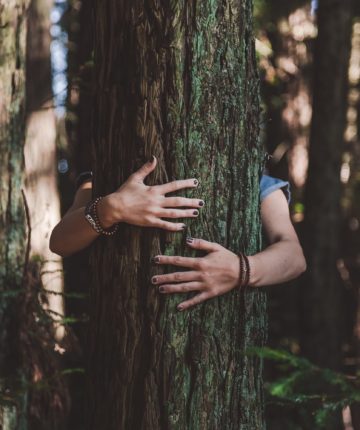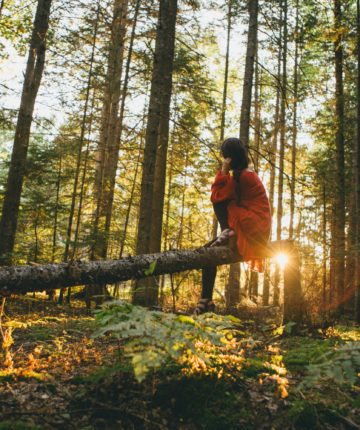
Forest Bathing
No Towel Needed
I’ve been out bathing — without a towel, soap, or even a tub. Instead, I’ve been walking, slowly, through the gateway between field and forest. Each step is intentional. With each breath, I taste the autumn air, filled with the scent of sun-warmed leaves and the spicy aroma of the nearby marsh.
I’m not alone on this ramble. Around me, others are reaching out to feel the rough, chip-like bark of the cherry tree and inhaling the pungent scent of white pine sap. Each one of us has accepted the invitation to slow down, take notice, wake up our senses, and come into the comfort and embrace of the woods. We are forest bathers.
The idea of “forest bathing” comes to us from Japan, where it’s called Shinrin-yoku and has been practiced since the 1980s. Shinrin-yoku asks you to put the emphasis on your senses: what do you see, smell, hear, touch, and even taste? Although it would like to think of itself as a new idea, I recognize its roots in other voices that have come and gone. I think especially of Thoreau, who didn’t just walk through the woods, he sauntered.
Forest bathing has a very different feel than a traditional nature walk or a hike to a specific destination. It’s about reconnecting, grounding yourself, opening your senses, and being fully present in the moment. Studies conducted in Japan and South Korea have shown that it has clear health benefits, including lower blood pressure, reduced levels of cortisol (a stress hormone), and slower heart rates. Participants also report feeling calmer, more focused, and rejuvenated after their Shinrin-yoku experiences.
How is it that a simple amble about the woods can leave us feeling refreshed, refocused, and calmer? It’s partly chemical. Research has shown that trees release phytoncides, volatile oils that can increase our immune function and decrease our production of stress hormones.
This idea that being around trees is good for us makes sense to me. Think of evolution: in our prehistoric lives as savannah dwellers, we survived by seeking refuge from ground predators in the safety of trees. We’re hardwired, as E.O. Wilson suggests in his book Biophilia, with a fundamental need to connect to the natural world. It’s part of our evolutionary heritage, our ancient blueprint. It’s what makes us who we are, and drifting away from it has affected our health. We become healthier, happier human beings simply by being outside in the embrace of a forest. Our rational minds may not always recognize it, but inside our most elemental selves, our spirits know it to be true.
So take yourself outside for a saunter. Don’t bring a field guide. Have no destination in mind. Just go with your senses open. Let your ears hear the rustling of the wind through the leaves, and your hands wander across soft moss. Lift your eyes towards the trees and notice how the light laces through their branches. Breathe the air like you are eating it, deep and full. And when you decide to finish your forest bath, don’t dry off. Instead, take it back with you in your heart, for the rest of the day, for the rest of your life



